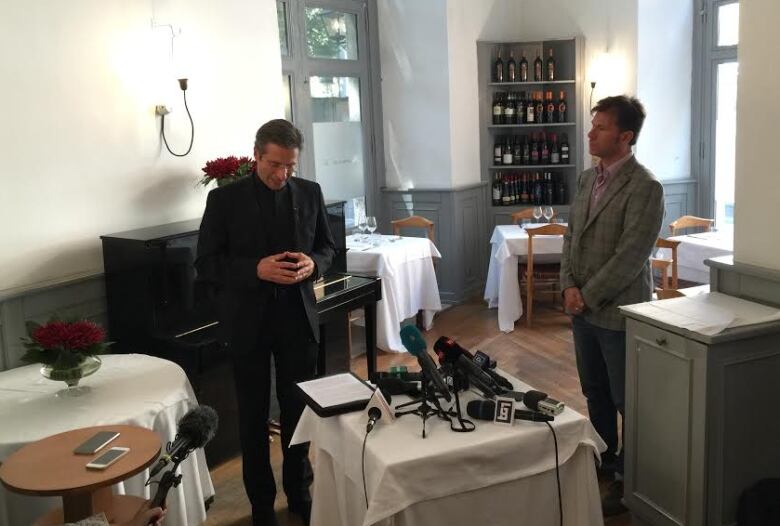Vatican expert says homophobia in Catholic Church due in part to high numbers of gay priests

Early last month, the Vatican published a new set of guidelines for the training of seminarians with the rosy title The Gift of the Priestly Vocation.
Yet, within the manual lay a decidedly less jubilant clarification of who qualifies for the job.
"The Church … cannot admit to the seminary … those who practice homosexuality, present deep-seated homosexual tendencies or support the so-called 'gay culture,'" it read.
The ban on gay men from entering the seminary came as a surprise to no one close to the Vatican. First introduced in 2005 by Cardinal Joseph Ratzinger (before he became Pope Benedict XVI), it was part of his attempt to purge the priesthood of homosexuality (both the act and the orientation), in part, as a misguided response to the sex abuse crisis.
Yet many Vatican observers, such as Thomas Reese, a Jesuit priest and National Catholic Reporter columnist, did not hide their dismay it remains in the manual.
"The idea that gays cannot be good priests is stupid, demeaning, unjust, and contrary to the facts," wrote Reese.
I know many very good priests who are gay, and I suspect even more good priests I know are gay.- Thomas Reese, Jesuit priest
Krzysztof Charamsa was one of them.
The former doctrinal official, and now defrocked Polish priest, worked for a decade or so under Ratzinger, when language describing gay people as "intrinsically disordered" made headway.
"It was horror to think that I can be gay, that I can be this thing for which we have no name," says Charamsa of his early years in the seminary and priesthood.
"I remember the continuous stress that people might understand you are gay."
But after falling in love with a man, Charamsa made a move that few other gay priests have dared.

In a blistering denunciation of what he called the Vatican's "paranoid homophobia," in late 2015 Charamsa stepped out of the closet at a news conference, with his gay partner by his side.
"It was desperate, my coming out," he said, "because I wasn't able to simply say, 'We need to study sexuality. We need to get informed.' But you know everybody at the Vatican knows if we begin to get informed [about sexuality], we'll have to change the doctrine. Because it's incoherent with human sexuality."
Charamsa, who now lives in Barcelona with his partner, says Pope Francis's softened tone toward LGBT Catholics gives him hope.
Yet, the Church's opposition to gay marriage remains unchanged, as do Charamsa's charges of the Vatican's paranoid homophobia.
Toronto Archbishop Thomas Collins, a doctrinal hardliner, says gay Catholics should be treated with compassion, but his advice to same-sex couples is the same advice the Catholic Church provides to Catholics divorced and remarried outside the church: do not have sex.
"We're dealing with a tendency or inclination," he said. "We're not slaves to anything in life. What it means to be free is not to be a slave to our inclinations."
Yet longtime Vatican expert Robert Mickens says euphemisms such as "homosexual tendencies" are just one of the many ways the Catholic Church avoids facing the issue of gayness in its midst.
Mickens, who left the seminary when he realized he was gay, says it's an open secret the Catholic priesthood and the Vatican are rife with gay men.
He discovered it first-hand in Rome after leaving the seminary.
I started to go out to gay places, beaches and nightclubs and I was running into all kinds of priests and seminarians and officials that worked at the Vatican, even at gay bath houses.- Robert Mickens
Mickens says he pities many of them because of the stress of living a double life.
And like Charamsa and many other gay priests who will speak openly about it, he says much of the homophobia generated by the Catholic Church comes from the very people homophobia targets — priests he describes as "self-loathing, homophobic and homosexual."
Yet, he says, it is not in the Church's interest to encourage open discussion about the high numbers of gay men in the priesthood any time soon.
"The church wants to keep this issue a taboo so that those pious young men will continue to think of the priesthood as the noble way, rather than, 'I'm gay and maybe that's how I should lead my life as a gay man.' If we allow people to live openly their homosexuality, we lose a great pool of our resources for ministry."
Listen to the full story at the top of this post.
This segment was produced by Megan Williams.
